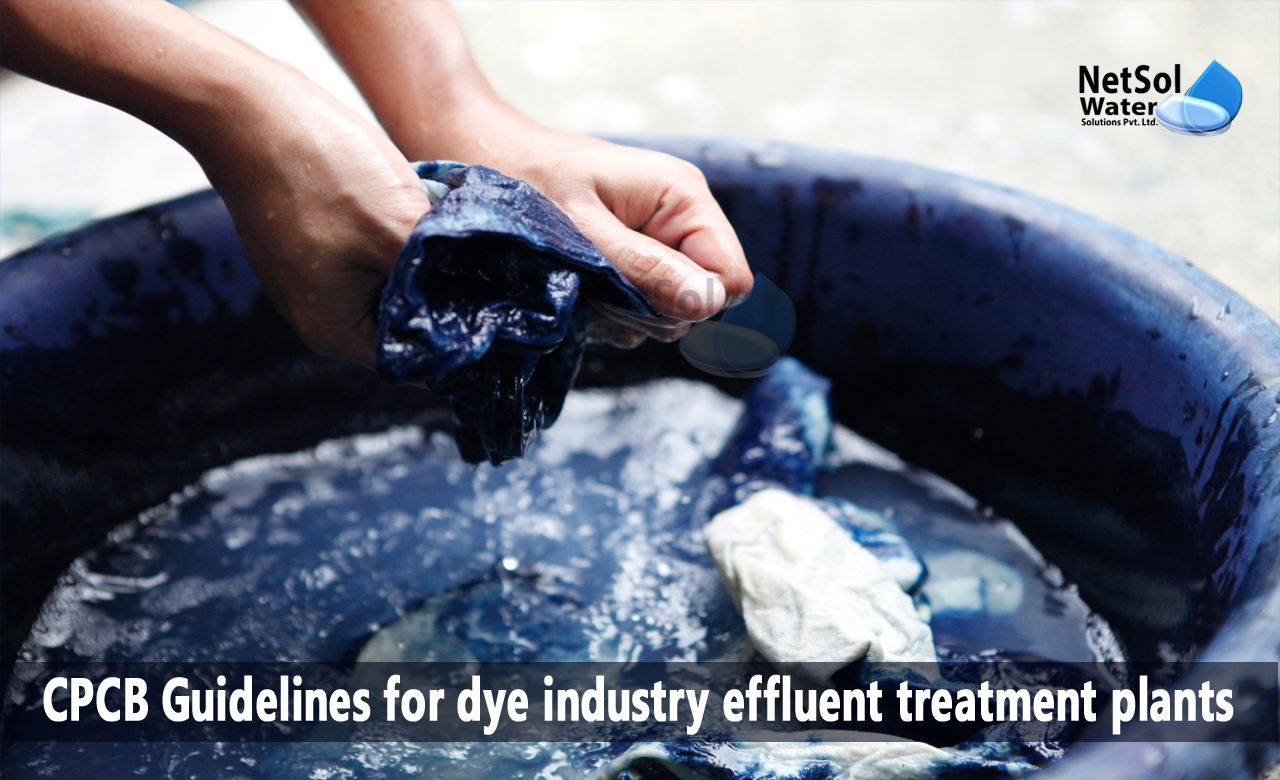Industrial wastes from dyeing and printing, both liquid and solid, disposed of in land and water bodies sink into groundwater and are transported in the direction of groundwater flow. The rate of percolation and transport of contaminants in groundwater flow rises, in dry and semiarid situations due to the high permeability of the soil.
As a result, many pollutants enter the groundwater system, endangering groundwater quality and negatively impacting the socioeconomic life of those, who rely on groundwater for various purposes. Therefore, certain guidelines are required for discharge of dye industry effluent, which are proposed by CPCB.
Usage of water in dying industries
Water is utilized in the dyeing and printing process, which consists of three steps: bleaching, dyeing, and printing.
The cloth is first immersed in turkey oil (caustic soda slurry) to eliminate starch before being washed, and run through a bleaching powder solution. The fabric is alkalinized during this procedure, and it is then boiled with dilute acid and sodium sulfate.
The cloth is then washed with detergent and a whitening agent before being air dried. Before dying, the material is tightly wound on a roller and pushed through a tray of color dye solutions. The operation is done multiple times, and chemicals are used to fix the color permanently. After dying, the cloth is washed again.
What are the CPCB Guidelines for dye industry ETP Plants?
TREATED EFFLUENTS (Maximum concentration values in mg/l except for pH, colour, and SAR)
· pH = 6.0 to 8.5
· Suspended Solids = 100
· Colour, P.C.U (Platinum Cobalt Units) = 400
· Bio-Chemical Oxygen Demand [3days at 27oC] = 30 mg/l
· Temperature = shall not exceed 5 degree Celsius above the receiving water
· Chemical Oxygen Demand (COD) = 250
· Mercury = 0.01
· Hexavalent Chromium = 0.1
· Total Chromium as (Cr) = 2.0
· Copper = 2.0
· Zinc = 5.0
· Nickel = 3.0
· Lead = 0.1
· Manganese = 2.0
· Cadmium = 0.2
· Chloride = 1000
· Sulfate = 1000
· Oil and grease = 10.0
· Sulphide (as S) = 2.0
· Phenolic Compounds (as C6H5OH) = 1.0
· Total Dissolved Solids, Inorganic (TDS) = 2100**
· Sodium Absorption Ratio (SAR) = 26**
· Ammonical Nitrogen (as N) = 50
NOTES:
(i) If a business disposes of effluent on land directly or through a CETP, the industry or CETP, as the case may be, is obligated to install piezometers for groundwater monitoring. For plot sizes greater than 10 hectares, at least two piezometers per three hectares must be erected, with a total of 16 piezometers.
(ii) For plots smaller than 10 hectares, it shall be one per hectare with a minimum of six piezometers, in consultation with the appropriate State Pollution Control Board for piezometer location.
(iii) The Chloride and Sulphate criteria must apply only to the discharge of treated effluent, into inland surface water courses.
(iv) The Chloride standards shall not exceed 600 mg/I above the contents of raw water, and the Sodium Absorption Ratio (SAR) shall not exceed 26.
(v) Treated / untreated effluent shall be stored in holding tank(s), in a way that does not pollute groundwater.
Conclusion
The effluent from the dyeing and printing equipment is released into minor watercourses on land. The combining of dyeing and printing effluent reduces the quality of the wastewater.
The physicochemical effects have an impact on the environment and public health. As a result, wastewater from dye factories must be cleaned before being discharged into the environment.
How can we assist?
Netsol Water offers a wide range of sophisticated solutions, such as water softeners, wastewater treatment plants, sewage treatment plants, water treatment plants, RO Plants, as well as effluent treatment plants for various industries, including dye industry.
Netsol Water is Greater Noida-based leading water & wastewater treatment plant manufacturer. We are industry's most demanding company based on client review and work quality. We are known as best commercial RO plant manufacturers, industrial RO plant manufacturer, sewage treatment plant manufacturer, Water Softener Plant Manufacturers and effluent treatment plant manufacturers. Apart from this 24x7 customer support is our USP. Call on +91-9650608473, or write us at enquiry@netsolwater.com for any support, inquiry or product-purchase related query.



